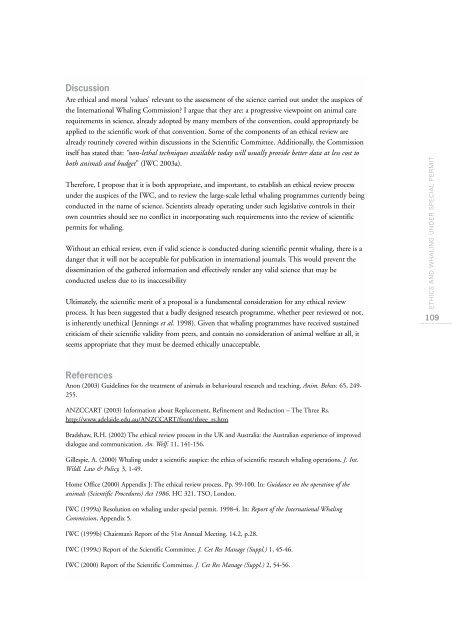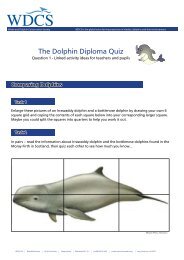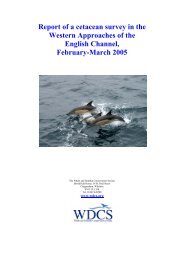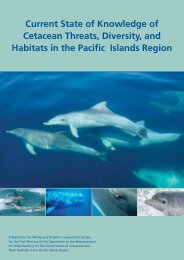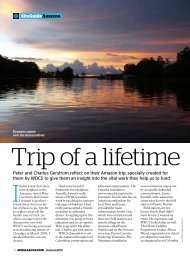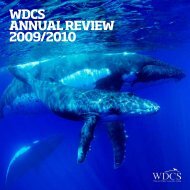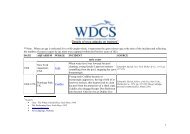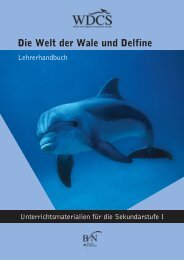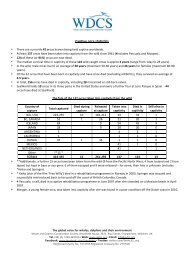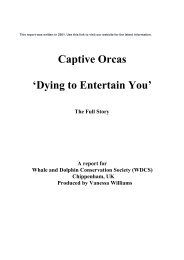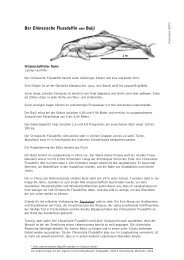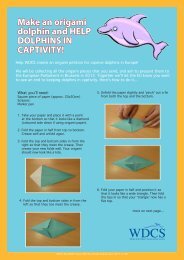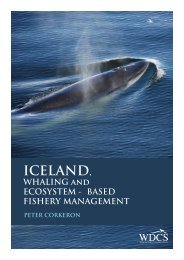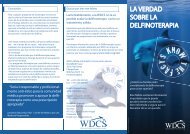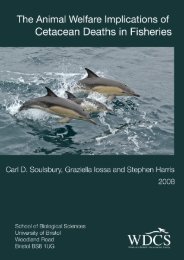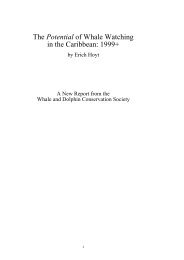TROUBLED WATERS - Whale and Dolphin Conservation Society
TROUBLED WATERS - Whale and Dolphin Conservation Society
TROUBLED WATERS - Whale and Dolphin Conservation Society
Create successful ePaper yourself
Turn your PDF publications into a flip-book with our unique Google optimized e-Paper software.
Discussion<br />
Are ethical <strong>and</strong> moral ‘values’ relevant to the assessment of the science carried out under the auspices of<br />
the International Whaling Commission? I argue that they are: a progressive viewpoint on animal care<br />
requirements in science, already adopted by many members of the convention, could appropriately be<br />
applied to the scientific work of that convention. Some of the components of an ethical review are<br />
already routinely covered within discussions in the Scientific Committee. Additionally, the Commission<br />
itself has stated that: “non-lethal techniques available today will usually provide better data at less cost to<br />
both animals <strong>and</strong> budget” (IWC 2003a).<br />
Therefore, I propose that it is both appropriate, <strong>and</strong> important, to establish an ethical review process<br />
under the auspices of the IWC, <strong>and</strong> to review the large-scale lethal whaling programmes currently being<br />
conducted in the name of science. Scientists already operating under such legislative controls in their<br />
own countries should see no conflict in incorporating such requirements into the review of scientific<br />
permits for whaling.<br />
Without an ethical review, even if valid science is conducted during scientific permit whaling, there is a<br />
danger that it will not be acceptable for publication in international journals. This would prevent the<br />
dissemination of the gathered information <strong>and</strong> effectively render any valid science that may be<br />
conducted useless due to its inaccessibility<br />
Ultimately, the scientific merit of a proposal is a fundamental consideration for any ethical review<br />
process. It has been suggested that a badly designed research programme, whether peer reviewed or not,<br />
is inherently unethical (Jennings et al. 1998). Given that whaling programmes have received sustained<br />
criticism of their scientific validity from peers, <strong>and</strong> contain no consideration of animal welfare at all, it<br />
seems appropriate that they must be deemed ethically unacceptable.<br />
References<br />
Anon (2003) Guidelines for the treatment of animals in behavioural research <strong>and</strong> teaching. Anim. Behav. 65, 249-<br />
255.<br />
ANZCCART (2003) Information about Replacement, Refinement <strong>and</strong> Reduction – The Three Rs.<br />
http://www.adelaide.edu.au/ANZCCART/front/three_rs.htm<br />
Bradshaw, R.H. (2002) The ethical review process in the UK <strong>and</strong> Australia: the Australian experience of improved<br />
dialogue <strong>and</strong> communication. An. Welf. 11, 141-156.<br />
Gillespie, A. (2000) Whaling under a scientific auspice: the ethics of scientific research whaling operations. J. Int.<br />
Wildl. Law & Policy, 3, 1-49.<br />
Home Office (2000) Appendix J: The ethical review process. Pp. 99-100. In: Guidance on the operation of the<br />
animals (Scientific Procedures) Act 1986. HC 321. TSO, London.<br />
IWC (1999a) Resolution on whaling under special permit. 1998-4. In: Report of the International Whaling<br />
Commission, Appendix 5.<br />
IWC (1999b) Chairman’s Report of the 51st Annual Meeting. 14.2, p.28.<br />
IWC (1999c) Report of the Scientific Committee. J. Cet Res Manage (Suppl.) 1, 45-46.<br />
IWC (2000) Report of the Scientific Committee. J. Cet Res Manage (Suppl.) 2, 54-56.<br />
ETHICS AND WHALING UNDER SPECIAL PERMIT<br />
109


